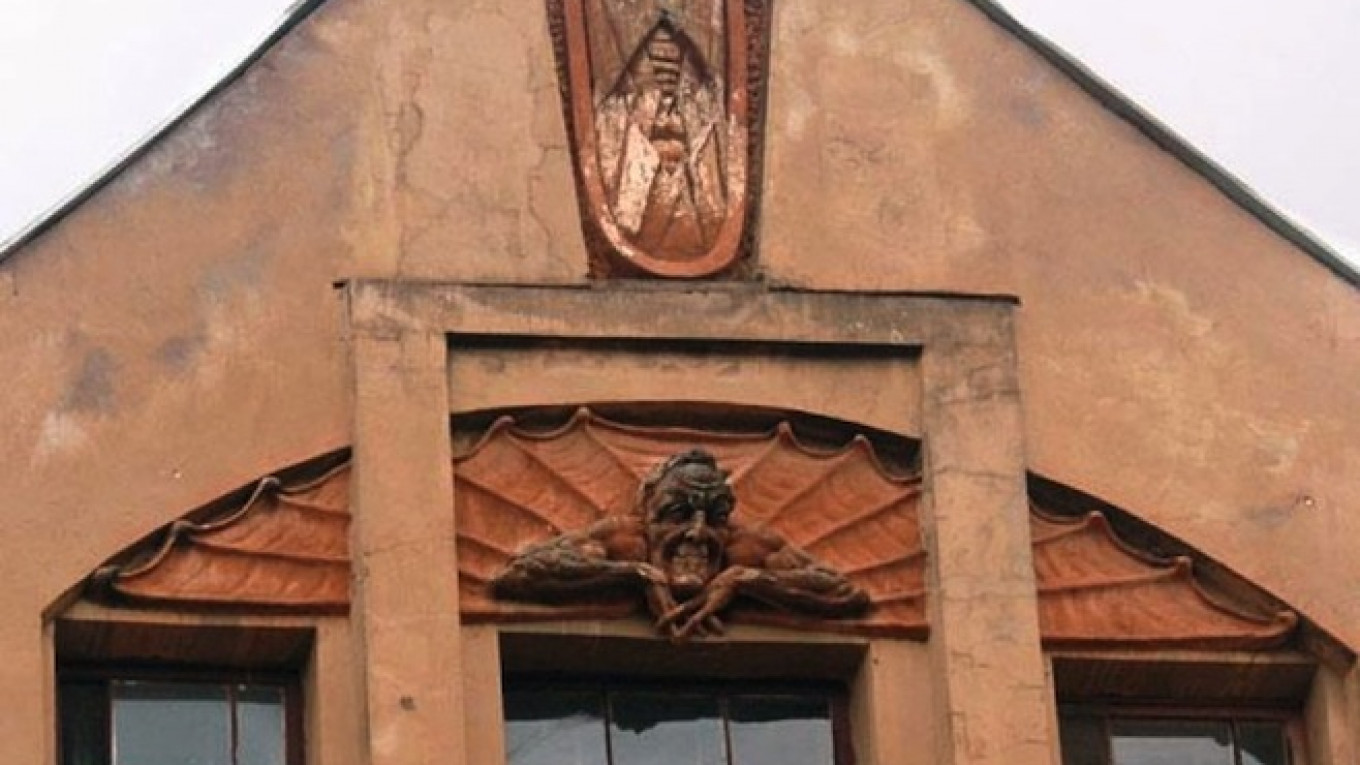A 100-year-old bas relief depicting the mythical demon Mephistopheles has been removed from the facade of a historical building in St. Petersburg overlooking the nearby construction site of a new Orthodox church, local inhabitants said.
Mephistopheles is a mythical demon that appeared as the devil in Johann Wolfgang von Goethe's play "Faust." The bas-relief of the character had been a feature of one of St. Petersburg's minor landmarks, a building on Lakhtinksaya Street known as the House with Mephistopheles.
Local news outlets and social media users reported that the relief was removed from the building without explanation on Wednesday. According to one Facebook user, historian Dmitry Bratkin, the house was designed by 19th and early 20th century architect Alexander Lishnevsky.
"Naturally, the monument was under protection," Bratkin said. "Or had been. Fifteen minutes ago, Mephistopheles was knocked off the facade."
One resident of the building, Kirill Alexeyev, told independent newspaper Novaya Gazeta that "workers showed up at 10 in the morning, did not introduce themselves, and did not say who had sent them."
Instead, the workers asked the building's residents to move their cars away from the building to avoid being damaged by falling plaster, and then proceeded with the removal of Mephistopheles, Alexeyev said.
"I said: What have you done, this is after all a monument protected by the state," he said, Novaya Gazeta reported. "They responded: Not to worry, it is old and dilapidated, and it will be restored in plaster."
The promise of recreating a version of the bas-relief in plaster indicated that the demolition had been a "planned action," supposedly approved by the authorities, instead of a grass-root stunt by activists displeased by the sight of a mythical demon, Alexeyev suggested.
However, a spokesperson for the city's architectural monument preservation department, known by its Russian acronym KGIOP, denied any knowledge of the incident, Novaya Gazeta reported.
The removal of the historical bas-relief has also prompted protests by some local lawmakers. St. Petersburg municipal legislator Boris Vishnevsky has sent a complaint to KGIOP, while his fellow lawmaker Alexander Kobrinsky said he would ask police to open a criminal investigation on charges of destruction of cultural heritage sites, St. Perersburg's Fontanka news agency reported.
Some commentators also claimed that the removal of sculpture might be connected to the construction of an Orthodox church that would face the "House with Mephistopheles."
"A couple of days ago, a cross was placed on the roof of the church that is under construction across [the building]," Bratkin wrote on his Facebook page. "Yesterday, some sprightly people showed up and took photographs of the facade with the Mephistopheles, and today at 3 in the afternoon, a worker hung down from the roof and — whack, whack, whack."
Natalya Levina, another local woman, said her neighbors had spotted "people from the church" looking around and inquiring about the "demon," the Metro news agency reported.
Historical-preservation activists have asked police and the construction firm that is building the church about who had authorized removing the Mephistopheles image, Levina was quoted as saying. Both organizations denied having any knowledge of who authorized its removal, she said, according to the report.
Lishnevsky, the architect, died during World War II after being evacuated to a hospital in Yaroslavl — a historical city 250 kilometers to the northeast of Moscow. Much of his work survived the devastation of the was and the secular policies of the Soviet Union.
The Mephistopheles bas-relief was created in 1910-1911, Fontanka reported.
Contact the author at [email protected]
A Message from The Moscow Times:
Dear readers,
We are facing unprecedented challenges. Russia's Prosecutor General's Office has designated The Moscow Times as an "undesirable" organization, criminalizing our work and putting our staff at risk of prosecution. This follows our earlier unjust labeling as a "foreign agent."
These actions are direct attempts to silence independent journalism in Russia. The authorities claim our work "discredits the decisions of the Russian leadership." We see things differently: we strive to provide accurate, unbiased reporting on Russia.
We, the journalists of The Moscow Times, refuse to be silenced. But to continue our work, we need your help.
Your support, no matter how small, makes a world of difference. If you can, please support us monthly starting from just $2. It's quick to set up, and every contribution makes a significant impact.
By supporting The Moscow Times, you're defending open, independent journalism in the face of repression. Thank you for standing with us.
Remind me later.






